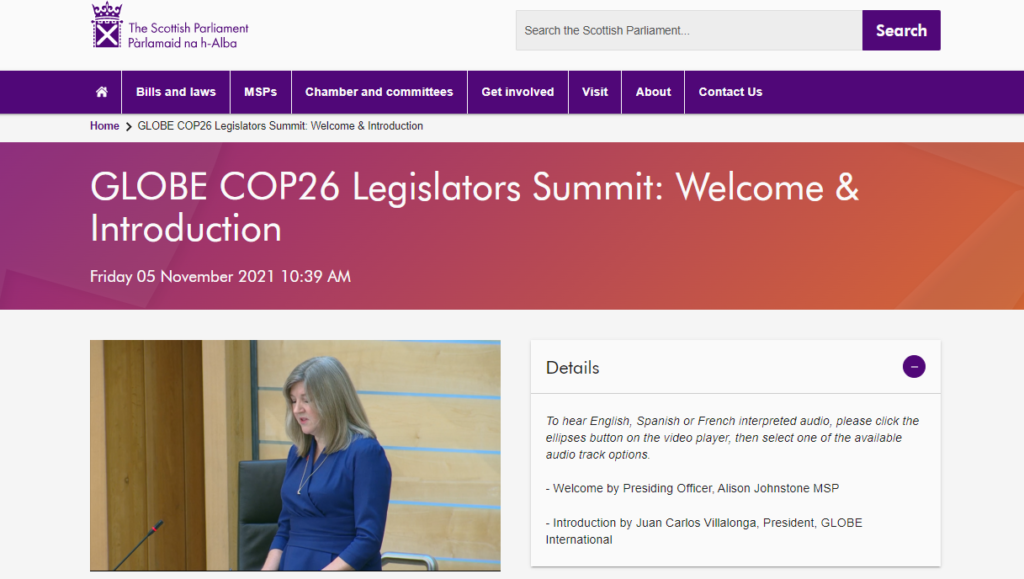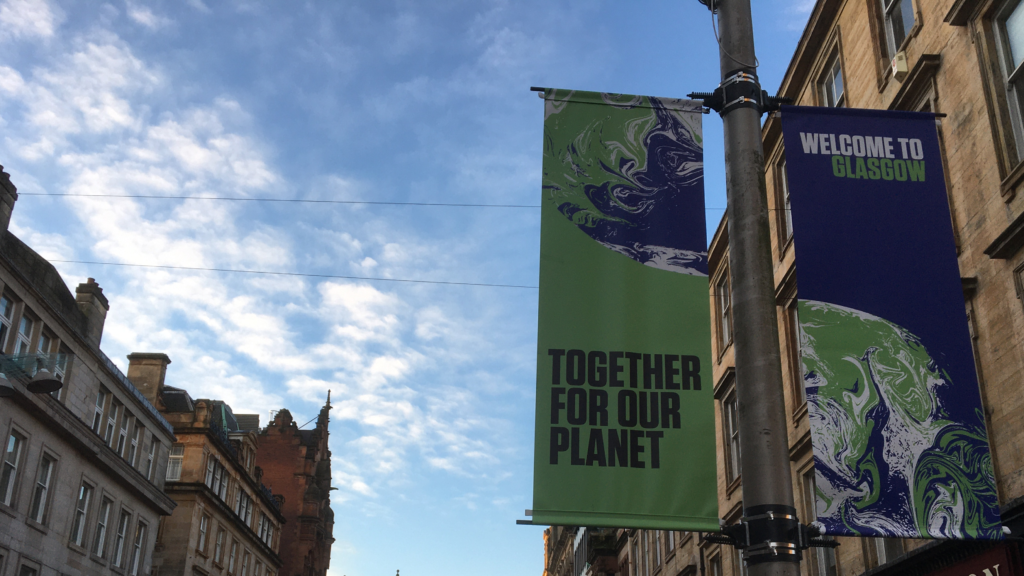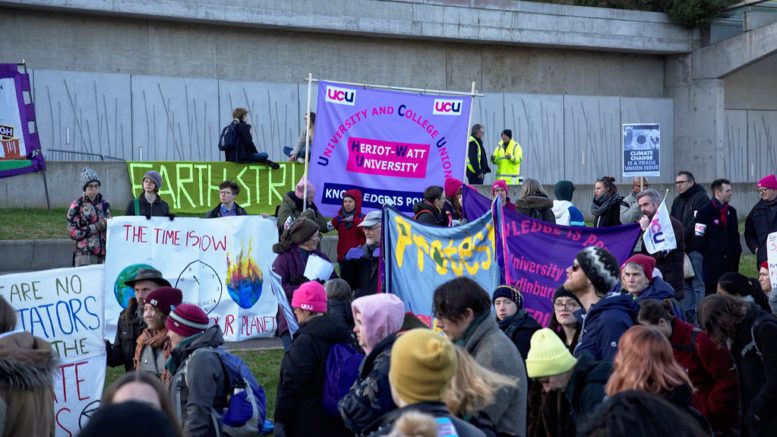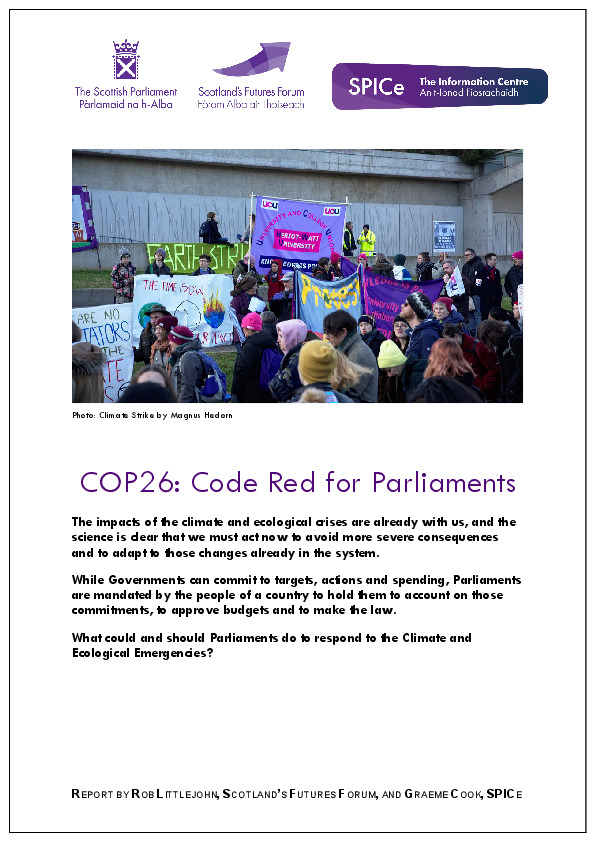Introduction
COP26 was a global United Nations summit about climate change and how countries plan to tackle and adapt to it. It was held in Glasgow from 31 October to 12 November 2021, and was widely considered to be the last opportunity to deliver on commitments made in Paris in 2015 to keep global temperature rise to between 1.5°C and 2°C.
Given the growing importance of legislatures in tackling the interlinked climate and ecological crises, the Scottish Parliament worked to create spaces for parliamentarians to share ideas and debate how parliaments can respond as institutions. Its partners in this work were Scotland’s Futures Forum, GLOBE International, the UK Climate Change Committee, and the Nordic Council.
This report brings together the key themes from the events hosted by the Scottish Parliament. It also identifies a pathway for Parliaments in tackling the climate and biodiversity emergencies.
Key message
At its core, the role of a Parliament remains the same: to represent the people of a country and to hold the Government to account. In tackling climate change, Parliaments should fulfil these key functions by:
-- Analysing what is happening with trustworthy and reliable information
-- Scrutinising effectively by making climate change central to all that they do
-- Sharing experiences and lessons with each other – a global problem needs global solutions
Other Resources
- Net Zero, Energy and Transport Committee | Scottish Parliament Website
- COP26 – Hub for SPICe material – SPICe Spotlight | Solas air SPICe
- Scottish Parliament Sustainable Development Impact Assessment tool | Scottish Parliament Website
- Research prepared for Parliament | Scottish Parliament Website
- UN Climate Change Conference (COP26) at the SEC – Glasgow 2021 | ukcop26.org
A pathway for Parliaments
At its core, the role of a Parliament remains the same: to represent the people of a country and to hold the Government to account. In our events, the following potential pathway for Parliaments emerged: actions to analyse, scrutinise and share.
Analyse
To ensure that elected representatives and the societies they serve have the knowledge they need to take the right decisions, Parliaments must:
Provide and use trustworthy and reliable information
Impartial parliamentary research services, which serve the Parliament as an institution and work across the political parties, are in a unique position to build trust and provide tailored support.
Access external expertise
By bringing in external experts and international perspectives, Parliaments can make sure that elected Members, and those who support them, have the right information available to them to fulfil their parliamentary duties.
Ensure everyone can learn
Climate and ecological change present an existential challenge to us all, and all aspects of our lives will change. By making their work accessible, Parliaments can help society as a whole to understand the issues.
Scrutinise
A core part of any Parliament’s work is effective scrutiny. For that scrutiny to be successful, Parliaments must:
Make climate change central
Climate and ecological change must be at the heart of all political debate and of parliamentary scrutiny of governments and public authorities.
Be flexible
Climate change crosses traditional political boundaries. Parliaments must be open to doing things differently, including by establishing new structures.
Make democracy inclusive
Building the participation of all groups in society into decision-making processes will mean those who take decisions better understand their effect on everyone.
Share
Responding to a global emergency needs global co-operation and collaboration. Parliaments must:
Build and use networks
Parliaments are unique places, with specific roles. Those with similar powers or traditions should share experiences and learn lessons from each other.
Remember the global context
Climate change is having significant impacts in communities throughout the world. By staying connected, Parliaments will continue to understand what is happening and renew their imperative for action.
What did the Scottish Parliament do at COP26?
The Scottish Parliament hosted three events in different venues during COP26:
GLOBE COP26 Legislators Summit
The biggest and furthest reaching event was a landmark and hybrid global legislators summit in partnership with GLOBE International. This took place in the Scottish Parliament on 5 and 6 November 2021.

It included contributions from former Vice President of the United States of America Al Gore, former President of the Maldives Mohamed Nasheed and others on the systemic challenges for parliaments the world over. It also featured a presentation of The Moment by members of the Children’s Parliament and Scottish Youth Parliament.
As an institution in the global north, the Scottish Parliament recognised that it needed to ensure as fair and equitable representation as possible. It did that by enabling legislators from throughout the world to contribute to the event, in person and online, with supporting translators. The virtual summit was also open to others as observers.
Code Red: Parliaments & the Climate and Ecological Emergencies
The Parliament also collaborated with Scotland’s Futures Forum and the UK Climate Change Committee (UKCCC) to deliver a debate on the issues at the Scottish Government Climate Action Zone in Glasgow.
This brought together Dean Lockhart MSP (Convener of the Parliament’s Net Zero, Transport and Energy Committee), the Kenyan MP the Hon Charity Kathambi Chepkwony, Jenny Hill from the UKCCC and Professor Tahseen Jafry from the Glasgow Caledonian University to explore best next steps. The event was chaired by Malini Mehra, chief executive of the Global Legislators Organisation (GLOBE).
Code Red for Parliaments: vital institutions in the climate emergency
In the second week of COP26, the Scottish Parliament and Nordic Council co-hosted an event in the Blue Zone. This debate heard contributions from the Scottish Parliament’s Presiding Officer, Alison Johnstone MSP, and Ms. Annette Lind, Vice President of the Nordic Council, as well as provocations from Lord Deben, chair of the UKCCC.
Featuring perspectives from Nordic and Scottish young people as a central part of the debate, the event further unpacked how parliaments must evolve as institutions.
What came out of the events?
The debates in all the events were positive and engaging, but an overall message was that we all have to think about our actions more deeply. The effects of the climate and ecological crises, and our responses to them, will reach into every aspect of our lives.
The solutions will vary country to country, but the fundamentals will not: Parliaments must be representative, well informed and flexible to changing circumstances, in order to respond effectively to the code red for humanity.
Within that overall context, the following key messages emerged from the events:
The climate and ecological crises present an existential challenge to us all
They will lead us to question every part of public policy from the point of view of sustainability: not just transport, energy and environment, but our education, health and justice systems.
This is particularly true of discussions on our economic systems. Many speakers from around the world reflected on how countries measure success, noting in particular the limitations of using gross domestic product (GDP) as a metric.
Loren Legarda, Deputy Speaker of the Philippines House of Representatives, emphasised the value in spending today to avoid higher costs in future, a model that would be supported by a switch from considering GDP to a wider “natural capital” approach.
Deputy Maia Bitadze, Chair of the Georgian Parliament’s Environmental Protection Committee, echoed this call for a shift to a consideration of the impact of climate on humans and wider economy, while Jairam Ramesh from the Upper House of the Indian Parliament shared his belief that that, as long as countries see prosperity through the narrow lens of GDP, they will be hamstrung on climate action.
While Parliaments and politics have always been places of disagreement, debate and discussion, the issues at hand are all becoming more fundamental to how society functions and how people lead their lives.
Climate change is a magnifier
It makes all the other challenges we face around the world even harder to deal with: food security, access to water, migration, conflict, social cohesion, access to healthcare, gender inequality and poverty. That is the case for all countries, and it will affect all communities within those countries.
The work to improve our world, summed up in the 2030 UN Sustainable Development Goals, is therefore made harder and more complicated. Even without the climate and ecological crises, these issues are significant and multifaceted. In the context of a code red for humanity, they could not be more serious.
Dr David Cooper, Deputy Executive Secretary, UN Convention on Biological Diversity, also highlighted that the climate change and biodiversity crises are intimately intertwined and should be considered together. He recommended the importance of “ecological literacy” in the drafting of climate change plans, decision making and the setting of budgets.
We must hear everyone’s voices, particularly those in the global south
It is important to hear about the direct implications of climate change on people and nature, and to build that into public debate on the action we need to take.
Aware of its position in the global north, the Scottish Parliament worked hard to ensure that the events included the perspectives of those on the front line. The contributions from parliamentarians from Kenya and Brazil, for example, helped remind everyone of the effects felt across the world.
Deputy Viviane da Costa Reis, Member of Chamber of Deputies in the Brazilian Parliament, emphasised that climate change dialogue should extend beyond conferences to communities across the globe. She raised concerns about policy programmes that favoured business interests over those of local and indigenous communities and the needs of the Amazonian ecosystem.
Kenyan MP Charity Kathambi explained how women and children in Africa suffer the worst impacts of climate change. She advocated for women to be decision-makers and stated that, where there is no presence of women, there is no voice for women.
Bringing these perspectives directly into the discussion helps to remind us, especially in the global north, that the decisions made here – every day, not just at COP26 – have a direct and tangible impact on others around the world. It is down to individual, organisational and political choices as to whether that impact is positive or negative.
The impacts of climate change are felt most by those with the least power
Globally, this often means indigenous communities and women and girls. This should be considered when reviewing decision making processes.
When Ahmad Nader Nadery, former peace negotiator and Chair of the Civil Service Commission in Afghanistan, spoke at the Global Legislators Summit, he argued that climate change effects such as drought and flooding are falling disproportionately on women and children.
Mami Mizutori, Special Representative of UN Secretary General, UN Office for Disaster Risk Reduction (UNDRR) highlighted the overarching link between climate change and extreme weather events, weak governance, poverty, eco system destruction, land use and pandemics. She also explained that the least developed countries are poorest placed to recover from disasters.
This is a particularly important point, as a key message was that those on the front line are also often the people best placed to deliver solutions. This might not be because they know or care about climate change as an existential threat, but rather because they live with its consequences every day, and so must come up with ways to change.
Any response to the climate and ecological crises must include the voices, experiences and ideas of those affected.
This is a question for every level of government and administration
As many of the solutions will be found locally, local government will be in a key position to represent local communities and to support change within those communities.
Jenny Hill, from the UKCCC, pointed out that many local and regional government institutions and representatives are more trusted than central government. As she said, it is impossible to see how we can have many of the changes that we need happening without a clear role for local and regional decision making.
Dean Lockhart MSP, convener of the Scottish Parliament’s Net Zero, Energy and Transport Committee, reflected that, while national strategies are important, the people on the ground who have to implement the policies are often local government officials.
In that context, local government needs not just the finance to support change but the expertise among officials to lead it, too – a point that does not always receive the attention it deserves.
The convening power of parliaments is critical
Parliaments are where elected representatives come together to debate and decide on the key issues facing their countries. They come from all parts of those countries and represent a wide range of viewpoints and experiences.
This convening power can only be enhanced if Parliaments also bring in and amplify the voice of citizens. Representative democracy works best when it provides a route for all citizens to participate, not only through the ballot but in the decision-making processes that come together in the Parliament. As cross-party, cross-national institutions, Parliaments are able to ensure that everyone’s voices are heard.
As Lord Deben from the UKCCC said, we have to make our societies much more democratic in the sense of making people feel that they have a real influence and that they can make a difference. As the key democratic institution in countries, Parliaments have to be part of that process.
A particularly important point is the role of children and young people in the democratic process. Many noted that, as it is the youngest in our countries who will have to live with the effects of climate change for the longest time into the future, their current rights and interests should also be considered. As mentioned above, they can be among the groups most affected by the current impacts of climate change. They may be the future, but they are also the now.
As part of the GLOBE Legislators Summit, delegates heard from representatives from the Children’s Parliament and the Scottish Youth Parliament on their COP26 initiative, ‘The Moment’. The representatives called on decision makers to prove to young people that they are listening to their concerns and urgently tackling climate change.
They also emphasised that children should be listened to on all days, not just special days of engagement. As was said at the summit, “there’s no going back if it gets too bad”.
The role of parliaments – and parliamentarians – is paramount
There was widespread agreement in our three events that the functions of scrutiny and oversight; making good law; and ensuring budgets align with government commitments are ever more important. In fact, they are essential if we are to meet our climate change commitments.
Deputy Loren Legarda from the Philippines Parliament emphasised the importance of parliamentarians providing oversight and challenge to Government, particularly ensuring that budget allocations support stated policy priorities.
Annette Lind, Member of the Danish Parliament and Vice-President of the Nordic Council, pointed out that parliamentarians are cornerstones of democratic governance and critical actors in combating climate change, in particular through ensuring the efficient development, execution and evaluation of climate policy.
As she said, part of that is requiring the government to explain itself and justify it its action to parliamentarians as representatives of the citizens and taxpayers.
Most pointedly, it was clear at all events that, as Mohamed Nasheed, Speaker of the People’s Majlis (Maldives Parliament) noted in response to a question from a member of the Parliament of Uganda, “Democracy is the most important adaptation measure”.
What next? A pathway for Parliaments
The experience of climate and ecological change will be different for different people in different countries. The political culture and system will also vary. So the steps that Parliaments take to respond will be different.
At its core, however, the role of a Parliament remains the same: to represent the people and to hold the Government to account. Given that, there emerged from our event a pathway for Parliaments: actions to analyse, scrutinise and share.
The following actions are likely to form part of any effective response to the Code Red for Parliaments. They are illustrated with examples the Scottish Parliament has been involved in, but there will be others around the world from which we can all learn.
As the final part of the pathway suggests, climate and ecological change is a global problem and solutions will come from throughout our world.
Analyse
Lord Deben of the UKCCC stated, “even if people have good-hearted views, they need to be informed.” Parliaments and the societies they serve must have the knowledge they need to take the right decisions.
This includes the following actions:
Provide and use trustworthy and reliable information
Functions such as the Scottish Parliament Information Centre and the Libraries in the UK Houses of Parliament provide impartial, accurate and relevant information for elected Members and the staff and officials who support them.
Such offices, which serve the Parliament as an institution and work across the political parties, are in a unique position to build trust and provide tailored support.
By making their work public, parliamentary research services can also help benefit society as a whole to understand the issues.
Access external expertise
While parliamentary research and support services will have important expertise, they cannot be expected to provide expert information on everything that Parliaments have to deal with. This is particularly the case with solutions to the climate and ecological emergencies.
By bringing in academics, international perspectives and expert bodies like the UKCCC, Parliaments can make sure that elected Members, and those who support them, have the right information available to them to fulfil their parliamentary duties.
Again, by making this information publicly available, Parliaments can support conversations in society more widely.
Ensure everyone can learn
Climate and ecological change will change all aspects of our lives. This means that, as well as their political work, Parliaments will have to consider the issue as institutions and as employers.
The way that Parliaments support staff and contractors, heat their buildings and procure services will be impacted. By providing relevant training and learning opportunities, Parliaments can equip their staff to help the institution evolve and adapt to meet the challenges.
By ensuring elected Members have access to learning opportunities at the right times, Parliaments can help elected Members in their work with constituents, and can support wider societal understanding of the issues.
Scrutinise
A core part of any Parliament’s work is effective scrutiny. As Annette Lind from the Nordic Council noted, this is “the process of examining expenditure, administration and policy in detail and on the public record.” For that scrutiny to be successful, “our policies and frameworks need to speak to everyone”, as Professor Tahseen Jafry said.
This includes the following actions:
Make climate change central
Given the existential threat posed by climate and ecological change, it must be at the heart of all political debate and at the heart of parliamentary scrutiny of governments and public authorities.
Parliaments should routinely assess all proposed laws, expenditure, administration and policy for their effect on sustainability. This includes asking whether, given its long-term importance, sustainability is a more important consideration than other benefits such as changes in tax or improvements in efficiency.
By asking these questions of governments and public agencies, Parliaments will help drive change within society.
Be flexible
Climate change crosses traditional political boundaries: efforts to tackle it in one policy area may well affect others. There is a need to avoid unintended consequences of a decision in one policy area on another, and a wider approach to scrutiny can support that work.

Parliaments are often traditional institutions, but they need to be open to doing things differently, including by establishing new structures, bringing existing committees together and reviewing their own rules. The Scottish Parliament’s Sustainable Development Impact Assessment tool is one example of a new process designed to support elected Members and those who support them to work more effectively.
By remaining flexible, Parliaments will protect their own position as a central place in society’s work to tackle climate change.
Make democracy inclusive
The participation of all groups in society is required in the decision-making process if we are to make the transition work for us all. This is especially the case for those traditionally underrepresented in politics, such as women, children and those from minority communities.
By building in participation in parliamentary processes, Parliaments will ensure that those who ultimately take the decisions understand better the effect of those decisions on everyone in society.
Share
As Fiona Hyslop MSP said – from a Scottish perspective – this global emergency will need co-operation and collaboration from countries across the UK, across Europe and across the world. This is a global problem that requires global solutions. Like other institutions, Parliaments need to be able to learn from each other, sharing good practice and supporting each other’s work.
This includes the following actions:
Build and use networks
Parliaments are unique places, with specific roles within a country, and those with similar powers or traditions may find it useful to test ideas, share experiences and learn lessons from each other. This is the case both for Members and for staff and officials.
Equally, Parliaments are usually physically located within cities, but have a role in all communities in a country, and they can learn from what their neighbours are doing, whether that is in Government buildings, office blocks or heritage sites.
More widely, by using existing networks such as the Nordic Council or the British Irish Parliamentary Assembly, Parliaments can make the most of the learning that is happening in other institutions.
Remember the global context
This is particularly important for the Global North, but it is essential for everyone to be reminded of the global situation. Climate change is already having significant impacts in communities throughout the world, and the imperative for action is renewed when we learn about those situations. By staying connected with international bodies such as GLOBE, the Inter-Parliamentary Union and the Commonwealth Parliamentary Association, Parliaments will keep this global perspective and stay connected with the reality of what is happening throughout the world.

Partners





